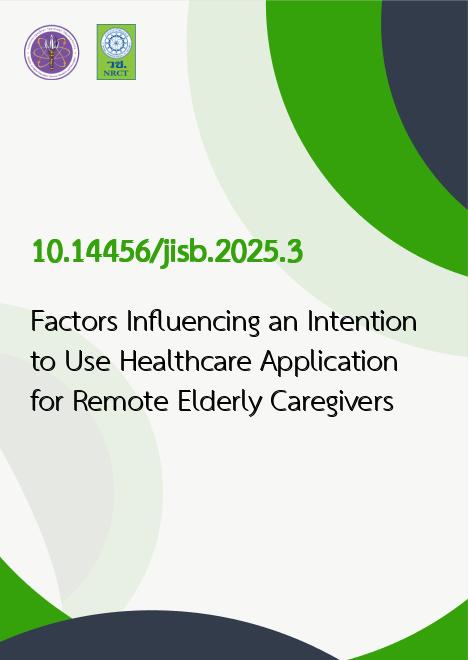
|
Factors Influencing an Intention to Use Healthcare Application for Remote Elderly Caregivers |
|---|---|
| รหัสดีโอไอ | |
| Creator | Nathha Sirithanapisarn |
| Title | Factors Influencing an Intention to Use Healthcare Application for Remote Elderly Caregivers |
| Publisher | MSMIS Thammasat University |
| Publication Year | 2568 |
| Journal Title | Journal of information systems in Business |
| Journal Vol. | 11 |
| Journal No. | 1 |
| Page no. | 24 |
| Keyword | UTAUT, Healthcare Application, Elderly Caregiver, Intention to use |
| URL Website | http://www.jisb.tbs.tu.ac.th |
| ISSN | 3088-1692 |
| Abstract | Thailand faces significant demographic challenges, as it is rapidly transitioning into a super-aged society. This trend, coupled with the social characteristic of working-age individuals often migrating to Bangkok for employment, results in a substantial number of elderly people living alone. Health applications have been developed to facilitate remote care for the elderly, allowing caregivers to monitor and support them via these applications. If these applications gain widespread acceptance and are utilized to their full potential, they could significantly promote the health of the elderly while also providing convenience for their caregivers. Thus, this research aims to study factors that influence an intention to use healthcare application for remote elderly caregivers, by using quantitative research methodology. The conceptual model applied in this research is adapted from Unified Theory of Acceptance and Use of Technology (UTAUT) and other factors from previous research including personal experience, privacy concern and trust. An online questionnaire was completed by 157 participants who have experiences in using a healthcare application and are remote caregivers. The data collected from participants is computed by statistical software to identify the relationships of factors from the above theories and frameworks. The results from this research show that social influence, trust, and personal experience are factors influencing the intention to use healthcare application for remote elderly caregivers. In contrast, performance expectancy, effort expectancy, and privacy concern do not influence the intention to use healthcare application for remote elderly caregivers. The study also shows that privacy concern does not influence trust in healthcare application for remote elderly caregivers which does not support the hypothesis of this research. These findings can be beneficial for government agencies, application developers, and those who are in healthcare industry for developing and enhancing the effectiveness of the healthcare products and services by applying technology and innovation. |